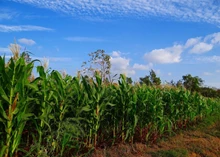
"According to the central administration, there is currently no rice in the country. Telangana is the top producer of paddy, with 56.44 lakh acres under cultivation in Yasangi. "Unfortunately, the Centre is refusing to buy rice grains from us," he stated on March 18 during the Kisan Mela.
The Kisan Mela was held at the Central Institute of Medicinal and Aromatic Plants (CIMAP) by the Council of Scientific and Industrial Research (CSIR).
He claimed that the Centre lacks scientific estimates of the crops that must be grown. "The crops being cultivated in different regions of the country should be estimated, and crop growth should be supported based on these numbers," Singireddy said.
According to the agricultural minister, there is a high demand for medicinal plants in international markets. "Medicinal plant cultivation should be supported since without medicinal plants, there will be no medications for the world's 800 million people," added the BRS head.
According to Singireddy, cosmetic items containing chemical chemicals are hazardous to one's health, but natural medicinal herbs can provide a superior quality of life. "Natural products are becoming more popular in society. China controls the global medicinal plant market. Farmers should be encouraged to plant in-demand crops, he says.
About CIMAP:
The Central Institute of Medicinal and Aromatic Plants, or CIMAP, is a cutting-edge plant research facility of the Council of Scientific and Industrial Research (CSIR).
'To coordinate & channel the current operations in the field of medicinal plants conducted by different agencies, State Governments, etc., to create India's already existing medicinal plant resources, to bring under cultivation some of the important medicinal plants in high demand, and to introduce the cultivation into the country of exotic medicinal plants of high yielding active principal content.' It was also decided that because the work on all parts of aromatic plant culture was identical to all aspects of medical plant cultivation, aromatic plants should be included in the scope of CIMPO.











